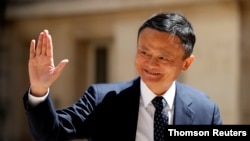China’s regulators have reiterated that their probe into financial technology giant Ant Group, founded by the beleaguered billionaire Jack Ma, would not undermine the company’s development and was not a move against private firms – a message widely seen as a government effort to alleviate market concerns over the entrepreneur and the fate of his business empire, Alibaba Group.
But most observers VOA spoke to remain convinced that by tightening regulatory controls, China is pressuring Ma into cooperating and sharing the troves of consumer-credit data collected by both Ant and Alibaba, which is also under anti-monopoly investigation.
The observers said that, with Ma’s help, China will be able to reinforce its digital authoritarianism – the use of high-tech tools to censor, surveil, repress and manipulate domestic or even foreign populations.
Three flows
“What the Chinese Communist Party (CCP) covets the most is the digital hegemonic power that Ma has possessed. That is, the dominance of three flows: flows of money, information and content,” a data and cybersecurity expert told VOA on the condition of anonymity for the matter’s sensitivity.
The expert said that he believes Ma can’t avoid granting the CCP access to voluminous data on nearly a billion Chinese consumers’ spending habits, borrowing behaviors and bill- and loan-payment histories, stored on Ant’s or Alibaba’s platforms.
With that access, China would be able to crack down on financial crimes, including tax evasion and money laundering activities among online merchants and consumers, some of whom may be CCP members or civil servants, as a part of the government’s anti-corruption campaign, he said.
But it will also empower what he calls “the authoritarian regime” to step up social controls such as censorship of speech and information as well as suppression of political dissidents and religious believers. For example, he said, the authorities in China could more easily track down members of “underground” churches by going through their online purchases of the Bible or Quran.
Now that Alibaba is exporting cloud-based services overseas, China may further be able to extend its digital authoritarianism beyond its borders by, for example, ordering the company to block foreign countries and their products such as Australian wine on its online platforms, according to the expert.
Currently, most of Alibaba’s active users are based in China, but company CEO Daniel Zhang has pledged to double its clientele, aiming to serve more than two billion customers globally by 2036.
Stepped-up social controls
The expert added that China is already capable of invading foreigners’ privacy by accessing personal data such as passport numbers through a “backdoor” inserted into China-made hardware. For example, China manufactures 90 percent of the world’s card readers, in which, backdoors can be exploited to pose security risks, he said.
Law Ka Chung, former chief economist at the Bank of Communications in Hong Kong, agreed that China’s ultimate goal is to gain access to Alibaba’s big data to amplify social controls, which he said may soon extend to the population in Hong Kong and create a chilling effect.
“With this [control] in place, most people will feel intimidated, knowing that it [the government] can [use this piece of information to] threaten you. You’ll then be horrified and refrained from expressing dissenting views or opinions. That’s its purposes,” Law told VOA.
The economist said he believes Alibaba will eventually be nationalized or put under China’s tight grip through controlling Ma’s ownership.
In a broader geo-political game, Abishur Prakash of the Center for Innovating the Future, said he believes the reason for China’s recent move to tighten regulatory controls over its tech giants including Ma’s Ant and Alibaba is because China plans to use them to expand its geopolitical influence overseas.
China’s geo-political tools
“China has sensed an opportunity to gain more control over its large technology firms. And China is using the threat of restructuring as a way to… gain more leverage. And ultimately why China is doing this goes back to geopolitics of tech that China needs these companies to now truly become geopolitical players in their own right and almost like become tools of foreign policy,” Prakash told VOA earlier.
For example, Alibaba exported an artificial intelligence-driven service called City Brain to Malaysia last year, which has been rolled out to help the capital city of Kuala Lumpur become “smarter” with reduced traffic time.
The Toronto-based analyst said he believes China plans on guiding these tech companies and their exported services as a new kind of foreign policy manifesto and in a certain direction, that is in China’s geopolitical interests, similar to the way the U.S. Clean Network Initiative works.
Swirling speculations
But Li Chengdong, CEO of Dolphin Think Tank in Beijing, dismissed speculation that China has a hidden agenda behind its recent regulatory clampdown.
Li said that China’s regulators have made it clear that its crackdown was meant to rectify unfair business practices and ensure market orders, instead of targeting only at Ma and his business.
“The worst that can happen to [Ant] is to rectify its [unfair] business practices or fix things it has done wrong. Nothing to do with [Ma] being caught in the [party’s] crosshairs. Neither is the government’s anti-monopoly probe specifically targeted at Alibaba, but across all internet platforms. You see, [e-commerce website] Vipshop.com was also fined recently… Hence, I think the market has read too much into [the regulators’ move],” Li told VOA over the phone.
Both Liang Tao, vice-president of the China Banking and Insurance Regulatory Commission, and Chen Yulu, vice governor of China’s central bank, have said in the past week that, under their guidance, Ant is working on rectifying its businesses while maintaining normal operations.
However, Ma’s absence from public view since he last blasted China’s regulatory system in late October had fueled speculation about his whereabouts and the fate of his business empire until his pre-recorded appearance on a TV show last Wednesday.




